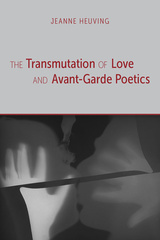Blue Studios
Poetry and Its Cultural Work
SERIES:
Modern and Contemporary Poetics
University of Alabama Press
Examines the work of experimental poets and the innovative forms they create to disrupt assumptions about gender and cultural power
In her now-classic The Pink Guitar, Rachel Blau DuPlessis examined a number of modern and contemporary poets and artists to explore the possibility of finding a language that would question deeply held assumptions about gender. In the 12 essays and introduction that constitute Blue Studios, DuPlessis continues that task, examining the work of experimental poets and the innovative forms they have fashioned to challenge commonplace assumptions about gender and cultural authority.
The essays in “Attitudes and Practices” deal with two questions: what a feminist reading of cultural texts involves, and the nature of the essay itself as a mode of knowing: how poetry can be discursive and how the essay can be poetic. The goal of “Marble Paper,” with its studies of William Wordsworth, Ezra Pound, and Charles Olson is to suggest terms for a “feminist history of poetry.”
“Perspectives must be fashioned that displace and estrange the world,” Theodore Adorno wrote, and in the section "Urrealism" DuPlessis examines the work of poets from several schools (the Objectivists, the New York School, the surrealists) whose work embodies that displacement, among them George Oppen, Lorine Niedecker, H.D., and Barbara Guest. These writers’ radical deployment of line, sound, and structure, DuPlessis argues, demonstrate poetry’s power not as a purely literary, artistic, or aesthetic force but as a rhetorical form intricately tied to issues of power and ethics. And in "Migrated Into,” the author probes the ways these issues have informed her, as a poet and a critic; how the political has “migrated into” and suffused her own work; and how the practice of poetry can be an arousal to a deeper understanding of what we stand for.
‘Over the years DuPlessis has patiently explained the centrality of female poets and their feminism to the innovative tradition. In this stunning new collection she charts how she became a feminist critic (an essay that should be required reading) and challenges the continuing gendered assumptions of early 21st century poetries.’
—Juliana Spahr, author of Everybody’s Autonomy
‘Blue Studios is an intriguing defense of ‘affective reading,’ a defense and demonstration of some adventurous and nonstandard modes of essay-writing, and a suggestion of a kind of utopian horizon for poetry/poetics. A major collection by one of the most important poets and critics writing today, it is a proper (and improper) successor to The Pink Guitar.’
—Hank Lazer, coeditor, Modern and Contemporary Poetics
‘These contemplations from the work site DuPlessis calls the blue studio are documents of a major career. By turns—and sometimes all at once—autobiographical, critical, cultural, ethical, and poetic, they evoke, probe, read, think, and enact the making that is poesis. This is amazing, engaging, and important work.’
—Dee Morris, John C. Gerber Professor of English, University of Iowa
Rachel Blau DuPlessis is a poet, critic, and Professor of English at Temple University. She is the author/editor of more than 20 volumes of poetry and criticism, including The Objectivist Nexus: Essays in Cultural Poetics and Genders, Races, and Religious Cultures in Modern American Poetry, 1908–1934.








